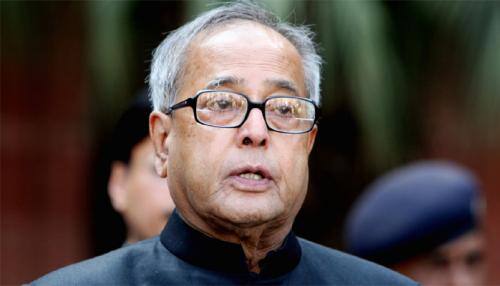- News>
- India
President Pranab Mukherjee stresses on imparting of quality education

President Pranab Mukherjee on Sunday stressed on imparting of quality education and promotion of skill development as he called for drawing inspiration from the ancient era when India was home to renowned higher- learning institutes that attracted foreign scholars.
Hyderabad: President Pranab Mukherjee on Sunday stressed on imparting of quality education and promotion of skill development as he called for drawing inspiration from the ancient era when India was home to renowned higher- learning institutes that attracted foreign scholars.
He rued that despite having a vast higher education system, only a couple of Indian institutes figured in the global top 200 and that too recently.
"When we talk of quality education, skill development is an inherent part of it. Given our population structure, its diversity and vastness, a degree catering to a 'one size fits all' prescription no longer works.
"Skill development is directly related to the employment prospects of our youth and, therefore, the focus has to be on providing quality education with skill development," he said.
Addressing the 98th annual conference of Indian Economic Association in Hyderabad, the president said, "When one talks about education and skill development, we feel a sense of pride when we look back at India's history."
India, in the ancient past, had been the front-runner in education and universities like Takshila (now in Pakistan) and Nalanda had been centres of higher learning for students from India and neighbouring countries, Mukherjee said.
With over 700 universities, including 44 central ones, and around 36,000 colleges, India has one of the largest higher education systems anywhere in the world, he said. "It is equally a matter of concern that till very recently we did not have a single university figuring in the global top 200."
He said it is only now, after concerted efforts and policy interventions, that two of our institutions -- IISC Bangalore and IIT-Delhi -- broke into the top 200 globally.
The need of the hour, therefore, is to focus not only on education per se, but more importantly on quality, he said.
The debate becomes even more pertinent when one talks of it in terms of accessibility on the one hand and privatisation and globalisation of higher education, on the other, he noted.
"While these measures aim at increasing employability, the emphasis also has to be on providing adequate employment opportunities. Growth would be meaningful and inclusive only if it results in improving the standards of the last man, as welfare economists are fond of saying."
India is a young nation and hence it becomes imperative for government and policy makers to come up with policies for achieving growth with job creation, he said.
The Indian economy has proved its resilience -- it has withstood the US financial and eurozone crises, he said. "We need to capitalise on these inherent and intrinsic strengths and create not only more jobs but also an entrepreneurial eco-system," the president added.
The president said the youth today does not wait for opportunities, but creates them. The number of start-ups and their annual turnover are clear indicators in this direction, he said.
"We have Sundar Pichai and Satya Nadella, rising from the Indian education system and heading top global companies (Google and Microsoft respectively). We need to strive to create such employability for our youth on domestic soil too and this would be the litmus test for our economists and policy planners.
"The government's 'Startup India', 'Standup India' programmes aim to do precisely this and I am hopeful that associations like the Indian Economic Association would provide the necessary prescriptive in this area."
The president said, "Growth which favours the top deciles or lower proportion of the population can never be sustainable or desirable."
"Balancing growth with equity and social justice is a fundamental requirement of our democratic polity. A careful study of not just income disparities but also of their source is required. That is the urgent task for economists to undertake," Mukherjee maintained.
On the policy side, the government has launched several programmes such as 'Make in India', 'Digital India' and 'Pradhan Mantri Jan Dhan Yojana' to promote financial inclusion and ensure the poor and disadvantaged are not left out of the benefits of economic growth, he added.
